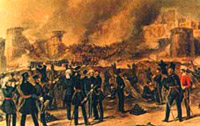 Anglo-Sikh Wars was a unique military experience for the British rulers in the Indian subcontinent. The British rulers had already become accustomed to take into account certain factors such as terrain or climate rather than the military skill of their opponents. The regular troops of the Sikh kingdom of Lahore were fully trained and armed along the European lines. They were also to present the British with a determined and resourceful enemy. The cause of the outbreak of the Anglo-Sikh Wars has been attributed to the Sikh army making their way across River Sutlej on 12th September 1845.
Anglo-Sikh Wars was a unique military experience for the British rulers in the Indian subcontinent. The British rulers had already become accustomed to take into account certain factors such as terrain or climate rather than the military skill of their opponents. The regular troops of the Sikh kingdom of Lahore were fully trained and armed along the European lines. They were also to present the British with a determined and resourceful enemy. The cause of the outbreak of the Anglo-Sikh Wars has been attributed to the Sikh army making their way across River Sutlej on 12th September 1845.
The causes of the Anglo-Sikh Wars can be summed up as:
•After the death of Maharaja Ranjit Singh, the anarchy in the kingdom of Lahore resulted in a powerful struggle for domination between the Lahore court and the ever-powerful vocal army.
•Suspicions arising in the Sikh army due to the recent British military campaigns which also included the annexation of Gwalior and Sind in the year 1841 and also the campaign of Afghanistan.
•The increase in the number of British troops that were posted near the border with the Lahore kingdom.
There have been two Anglo-Singh Wars:
First Anglo-Singh War
The first Anglo-Sikh war was fought between the Sikh kingdom and the British East India Company between the years 1845-1846. The causes of this war resulted from Ranjit Singh`s policy of wary friendship with the British and at the same time building up his forces to deter aggression both by the British and the Afghans. After the death of Ranjit Singh, the mutual demands and accusations between the Sikh Darbar and the East India Company, followed as a result of which diplomatic relations were broken.

Second First Anglo-Singh War
The second Anglo-Sikh war, which was fought in the years between 1848-49, resulted in the abrogation of the Sikh Kingdom as the consequence of the British expansionism. It was virtually a campaign by the victors of the first war to overcome the resistance who chafed at the defeat in the earlier war. The main cause of this war was the exile of Lal Singh on charges of conspiracy of the British resident. Following that the revolt of Multan also assumed the form of a national movement and that led to the beginning of the second Anglo Sikh war. After this war the Sikhs also accepted British control and remained loyal to their new rulers during the general Indian rebellion of 1857-58.
The other factor that was important in the Anglo-Sikh Wars. The British had allowed a number of Indian rulers to remain in power provided they backed the British. Many of the bigger rulers especially that of Mysore, Hyderabad and Maratha have spared no expense to rearm like the British and the Mutiny displayed the danger of this policy. The final factor was the discontent among the `warrior` caste of the Indian society. There were also several ambitious Indian who could not rise far enough to suit them and this was a major factor in the mutiny. The short term consequences of the Anglo-Sikh Wars was that the British worked hard to integrate India, limit the powers of the princes and keep a stronger army in India.



















